While China’s domestic and export sex-toy trade are thriving, in terms of variety there are still serious gaps in what is available in the domestic market. Dinah Gartner reports on the difficulty of finding a strap-on in Beijing in the not-safe for work Asian Sex Gazette.:
So it was that one evening last month I found myself trawling US and UK sex toy websites with fellow dyke in despair, an American editor for a local entertainment magazine, and known to some as The Stud of Beijing, in the vein (sic) attempt to fill my virtual shopping basket with a pleasing assortment of silicone and leather. The Stud comes with her credit card; I supply the wine.
But we are butt plugged at every turn. The Babes in Toyland website stubbornly rejects our Chinese address; we try calling the helpline - but the phone card we buy from the local shop is domestic calls only; Skype, which China threatens to block, doesn’t work with my 10 yuan microphone; and a US$20 online IDD phone card requires a confusing array of passcodes and we can’t work it.
The Stud sends the phone card company an angry email. Which, of course, is never answered.
The flaccid state of decent dildo availability in China may just stem from a lack of demand. Perhaps mainland lesbians just aren’t that hot for strap-on sex.
Says Elisabeth Lund Engebretsen, an anthropologist researching lesbians in Beijing: “Few people I met had actually had experience with them - they either did not find them, found them too expensive, or didn’t dare go into a shop to buy them.
“One pure T (stone butch) said she’d never wear one as that would make her realise even more that she is not a man, which she wanted to be.”
She says she felt that while dykes here showed some interest in using sex toys they didn’t make much of an effort into getting their hands on the equipment.
Having never been in the market, AsiaPundit has no idea where to buy strap on appendages. However, for those within China who are interested in large artificial penises, they may find a recent exhibit in Nanjing to be of interest.
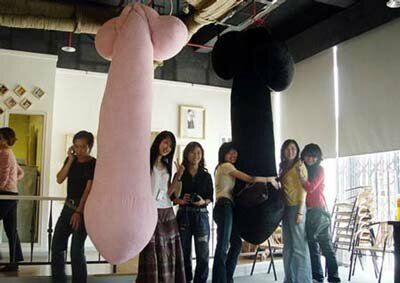
Technorati Tags: asia, china, east asia, northeast asia

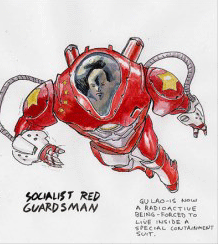
 Japan’s Ministry of Economy, Trade and Industry is working on a new set of safety guidelines for next-generation robots. This set of regulations would constitute a first attempt at a formal version of the first of Asimov’s science-fictional Laws of Robotics, or at least the portion that states that humans shall not be harmed by robots.
Japan’s Ministry of Economy, Trade and Industry is working on a new set of safety guidelines for next-generation robots. This set of regulations would constitute a first attempt at a formal version of the first of Asimov’s science-fictional Laws of Robotics, or at least the portion that states that humans shall not be harmed by robots. If you’re not familiar with the term, it frequently shows up on racist websites or websites that play up the East/West divide (but not on certain ones—more on this below). It is also used seemingly innocuously at times. It’s supposed to be a term that Asians use for non-Asians.
If you’re not familiar with the term, it frequently shows up on racist websites or websites that play up the East/West divide (but not on certain ones—more on this below). It is also used seemingly innocuously at times. It’s supposed to be a term that Asians use for non-Asians. While AsiaPundit is deeply concerned that his chosen profession is the most dangerous in his city of residence, he is a touch relieved. AP has been periodically concerned by some of the occupational risks he has seen others take in the city. But upon learning that he is in the most risky profession, he will be more relaxed.
While AsiaPundit is deeply concerned that his chosen profession is the most dangerous in his city of residence, he is a touch relieved. AP has been periodically concerned by some of the occupational risks he has seen others take in the city. But upon learning that he is in the most risky profession, he will be more relaxed. The teen obsession with yakking, text messaging and ring-tone swapping on cellphones might mean more than a whopping phone bill. For the most crazed, it’s a sign of unhappiness and anxiety, according to a new medical study.
The teen obsession with yakking, text messaging and ring-tone swapping on cellphones might mean more than a whopping phone bill. For the most crazed, it’s a sign of unhappiness and anxiety, according to a new medical study. The dolls have become increasingly popular among the Middle Kingdom’s misanthropes and trend-conscious teens. Customers purchase a doll (pin included), attach a piece of paper bearing the name of their enemy to the doll and then stab away. Voodoo Dolls Online offers a wide range of dolls in assorted colors. “Do you want to make your enemy feel as if someone is always stalking him behind his back?” reads the caption next to a doll clad in black. ” ‘The Magic Shadow Killer’ will thoroughly destroy his spirit.” Another popular item is the “Little Angel,” which purportedly brings good luck and helps its owner find true love.
The dolls have become increasingly popular among the Middle Kingdom’s misanthropes and trend-conscious teens. Customers purchase a doll (pin included), attach a piece of paper bearing the name of their enemy to the doll and then stab away. Voodoo Dolls Online offers a wide range of dolls in assorted colors. “Do you want to make your enemy feel as if someone is always stalking him behind his back?” reads the caption next to a doll clad in black. ” ‘The Magic Shadow Killer’ will thoroughly destroy his spirit.” Another popular item is the “Little Angel,” which purportedly brings good luck and helps its owner find true love.
 Indonesia’s secular identity is under threat from a proposed, Islamic-inspired anti-pornography law that would satisfy increasingly militant Muslims but begin curtailing the rights of the majority moderate followers of the faith. There is no room for such legislation in a country fighting to maintain the democratic freedoms it won so boldly by forcing dictator Suharto’s resignation eight years ago.
Indonesia’s secular identity is under threat from a proposed, Islamic-inspired anti-pornography law that would satisfy increasingly militant Muslims but begin curtailing the rights of the majority moderate followers of the faith. There is no room for such legislation in a country fighting to maintain the democratic freedoms it won so boldly by forcing dictator Suharto’s resignation eight years ago. Ne Win was perhaps a bit of both. He was a famously reclusive leader, known for his foul mouth, many marriages and obsessive superstition. It was his dabblings with numerology that had the most dramatic consequences for Burma. In 1987 Ne Win demonetized certain banknotes, replacing them with new notes with denominations of 45 kyat and 90 kyat – each value neatly divisible by nine (an astrologically auspicious number, and the general’s favourite). People’s already paltry savings were wiped out overnight and, with little to lose, a year later they took to the streets in the 1988 uprising.
Ne Win was perhaps a bit of both. He was a famously reclusive leader, known for his foul mouth, many marriages and obsessive superstition. It was his dabblings with numerology that had the most dramatic consequences for Burma. In 1987 Ne Win demonetized certain banknotes, replacing them with new notes with denominations of 45 kyat and 90 kyat – each value neatly divisible by nine (an astrologically auspicious number, and the general’s favourite). People’s already paltry savings were wiped out overnight and, with little to lose, a year later they took to the streets in the 1988 uprising.
 APTN, the television arm of the Associated Press news agency, has become the first western media organisation to open a bureau in Pyongyang.
APTN, the television arm of the Associated Press news agency, has become the first western media organisation to open a bureau in Pyongyang.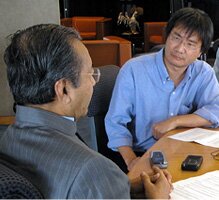 Malaysiakini editor Steven Gan who led his team of journalists to interview Dr Mahathir on May 16, a request denied for six long years and postponed three times after a consent was given in March this year, came home with two unmistaken conclusions.
Malaysiakini editor Steven Gan who led his team of journalists to interview Dr Mahathir on May 16, a request denied for six long years and postponed three times after a consent was given in March this year, came home with two unmistaken conclusions.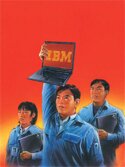 Fears and concerns that exist only in the minds of a deluded few (or many?) on Capitol Hill, as most industry watchers agree that the placement of any malicious hardware/software is extremely unlikely. But, that didn’t stop House members from patting each other on the back.
Fears and concerns that exist only in the minds of a deluded few (or many?) on Capitol Hill, as most industry watchers agree that the placement of any malicious hardware/software is extremely unlikely. But, that didn’t stop House members from patting each other on the back.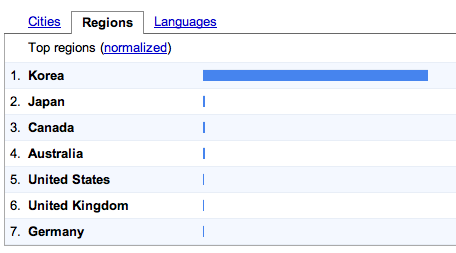
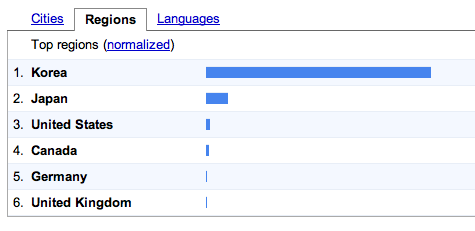
 This installment of the Hard Hat Show features Roland Soong of
This installment of the Hard Hat Show features Roland Soong of  The book, believed to have been written on the eve of the 2003 U.S.-led invasion of Iraq and titled “Devil’s Dance” in its Japanese translation, hit stores around the nation Friday.
The book, believed to have been written on the eve of the 2003 U.S.-led invasion of Iraq and titled “Devil’s Dance” in its Japanese translation, hit stores around the nation Friday. The researchers, all South Korean, report that kimchi and other spicy and fermented foods could be linked to the most common cancer among Koreans. Rates of gastric cancer among Koreans and Japanese are 10 times higher than in the United States.
The researchers, all South Korean, report that kimchi and other spicy and fermented foods could be linked to the most common cancer among Koreans. Rates of gastric cancer among Koreans and Japanese are 10 times higher than in the United States.
































